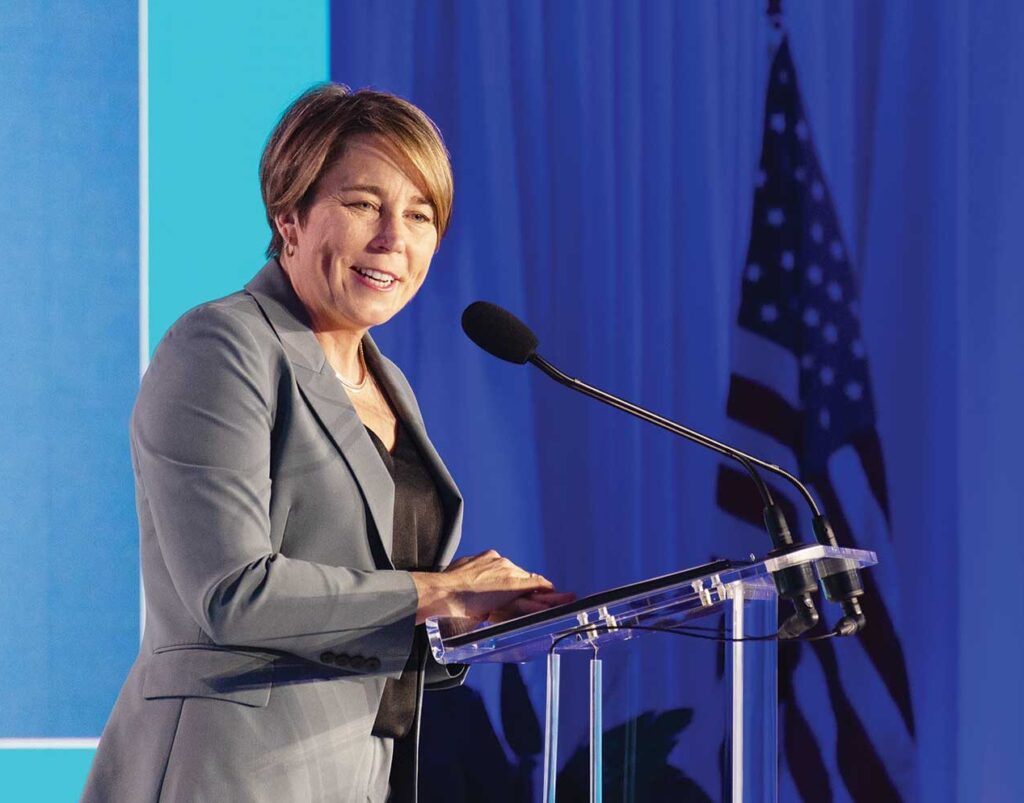State budget makes strides in education efforts
METCO funds largely left out of the mix

On July 29, when Governor Maura Healey signed the budget for Fiscal Year 2025, it finalized a process allocating $57.8 billion in funding for the commonwealth and state-funded organizations, including millions for educational efforts across the state.
Those allocations include state dollars for long-fought programs for students across age ranges. Among them: increased support for early education and child care programs, all the way to $93.5 million investment in funding to make the state’s community colleges free for all students who don’t already have a higher degree.
For some local education leaders, those investments mark a “transformational” moment in the state’s funding for school programming.
Pam Eddinger, president of Bunker Hill Community College, said she views this moment as a step forward in building a more complete system of educational support, connecting existing options in a previously “program-rich” but “vision-poor” ecosystem.

Pam Eddinger, president of Bunker Hill Community College, poses for a portrait Oct. 27. Under the new state budget, signed by Gov. Maura Healey July 29, made tuition and fees at community colleges, like Bunker Hill Community College, across the state free to Massachusetts residents regardless of income or age. BANNER PHOTO
“When I first came to Bunker Hill, I looked across the table, and I’d see the beautiful pearls and gems on the table, but nobody’s making jewelry,” she said.
Now, with funding for support across a student’s academic career, she said she sees those pieces align under state and municipal leadership, bringing these educational opportunities together into a clear pathway.
For Andrew Farnitano, a spokesperson for the Common Start Coalition, which advocates early childhood education support, the efforts are about providing students a level playing field in their K-12 education and beyond.
“It’s great that the state is really prioritizing education at all levels, and we’re hopeful that the investments that are being made in early education and care will help support the investments that are being made in in early literacy and higher education affordability, making Massachusetts a place where every child is able to thrive and succeed,” Farnitano said.
Free community college
Under a program called MassEducate, which is now set to launch in the fall semester, free community college could mean access to new opportunities and better job options, Eddinger said.
“We’re very optimistic that this will open up the possibility of higher education and college to a population that had not previously thought about college, and also get folks who have started [their degree] to complete,” she said. “There will be a very interesting mosaic of students coming under MassEducate.”
Those opportunities will be available to any resident, regardless of income or age, who hasn’t earned a bachelor’s degree. The program covers community college tuition and fees college and offers a $1,200 stipend for books and supplies.
Last year, the state launched MassReconnect, a smaller program that made community college attendance free to Massachusetts residents 25 years old and above without a bachelor’s degree. At Bunker Hill Community College, that effort brought in about 1,000 new students, Eddinger said. Statewide, the state recorded a 45% enrollment increase among students over 25.
Leaders from Bunker Hill and Roxbury Community Colleges said that the initial program set up the systems that they hope will allow them to easily bring in students under MassEducate.
“We’re hoping that, just like we saw with MassReconnect, we’ll see a significant increase in our enrollment,” said Johnathan Jefferson, president at Roxbury Community College. “We are ready and prepared to accept a large influx of students.”
Work still remains to fine-tune the initiative to make it as successful as possible, Eddinger said. She pointed to a number of barriers to attendance. A feasibility study that the school conducted found additional needs for support with tutoring and advising as well as capacity in the schools. Future developments in the effort, she said, should work to make sure those other areas are without gaps as well.
Limiting barriers is a priority at Roxbury Community College too, Jefferson said.
“Enrolling students in academic programs is the easy part,” he said. “Making sure that they have all the non-academic supports … is critically important to us.”
And the program will allow for expanded opportunities in burgeoning career fields. Schools like Roxbury Community College and Bunker Hill Community College have, in recent years, focused educational efforts in areas like green jobs and life sciences, fields they say have a lot of potential to bring students career success as well as work to tackle bigger issues like the climate crisis.
“Our vision here at Roxbury is that we provide our community with an education that matters,” Jefferson said. “That means that we’re going to provide them an education in high demand areas.”
Early childhood program funding
For the state’s youngest students, the budget also brought new support.
“It put a historic amount of money into early education and childcare. It’s the most generous budget for childcare in the history of Massachusetts,” said Farnitano.
He pointed to funding that makes permanent the Commonwealth Cares for Children grants, a state program that provides money to child care providers to be used for personnel costs, professional development, investments in things like supplies and curriculum or operational payments like rent and utilities. The grant program launched in 2021, initially using COVID-19 pandemic relief funds, and later using other temporary state funding.
“Childcare providers can count on this money to raise their salaries, to invest in their staff compensation,” Farnitano said. “We’re seeing that have a positive effect.”
According to the state, in the past year, the grants have contributed to a 7% increase in childcare programs, adding more than 10,000 seats statewide.
The legislation also expands eligibility for childcare subsidies — state support given to families to access early childhood programming — to up to 85% of state median income. That’s about $124,000 per year for a family of four or about $84,000 for a single family with one child. The cap is up from the 50% state median income limit previously in place.
“We’re talking about working-class, middle-income families who will now be eligible to receive help from the state with the cost of childcare,” Farnitano said.
METCO budget sees limited growth
Officials at METCO, the nonprofit school integration program, felt left out of the burgeoning vision for a cohesive academic pathway. The organization received about $29.9 million in the 2025 budget, an increase of about $500,000 dollars from the previous year.
METCO president and CEO Milly Arbaje-Thomas said that change will have little impact for a program that needs regular increases to support rising transportation costs and an increasing cost of living for staff. The organization had lobbied for $33 million in funding.
With about 3,200 participating students, Arbaje-Thomas said the small bump in funding will amount to only about $100 dollars per student, leaving the suburban districts that participate in the program with increases of less than $50,000 to cover any higher expenses.
“No one is getting more than $40,000 — and nothing costs $40,000,” she said. “Not one bus, not one position.”
The limited increase comes after the program was level-funded in the 2024 budget, the first time since 2018 that the program didn’t receive an increase and of all the budget increases the program has received in recent years, the one in the new budget clocks in at the lowest. Between 2018 and 2023 the state provided between $1.375 million and $2.3 million in increases each year.
This has left gaps for the program to fill. Arbaje-Thomas said that the program’s central office faced a $200,000 deficit in the past year, that it had to seek private funding to close.
“We had wanted that funding to be for specific programming, and we had to use it to close gaps, versus an add-on to what we are doing,” Arbaje-Thomas said. “That was a little bit hard to swallow.”
The group will seek inclusion in potential supplemental budgets as the fiscal year progresses, an effort they tried in response to the level-funding without success.
It also doubled its number of METCO champions — legislators in the House and Senate who work as advocates for the program. Previously, Sen. Liz Miranda operated as one such champion, representing the program’s urban constituents, while Rep. David Linsky represented METCO’s suburban districts. This year, the program added Rep. Christopher Worrell and Sen. Jason Lewis, to have an urban and suburban champion in each chamber.
Arbaje-Thomas said the group plans to meet with its champions every couple of months in an effort to get ahead of future funding discussions. She said she hopes the new legislative advocates might also make it easier to tap into revenue from the Fair Share Amendment, which was approved by voters in 2022 and directs funds from an additional 4% surtax on income over $1 million to education and transportation efforts across the state.
The limited funding increase to the organization has also meant that METCO 2.0, the program’s anti-racism initiative which it launched in 2022 with a specific $500,000 state investment in the Fiscal Year 2023 budget, is effectively on hold.
Arbaje-Thomas said that METCO specifically opted to not request separate funding for the initiative this year, knowing that funds would be tight and hoping that the money would instead be directed to covering cost increases and day-to-day expenses. Instead, no major bump came, leaving the program to look for ways to keep gaps closed and keeping the anti-racism initiative — which included equity assessments and efforts to promote culturally responsive teaching — stalled for now.
The hold in the initiative comes even as a report released this June by the Racial Imbalance Advisory Council, a state oversight committee, found that more than 225,000 students across the state attend segregated schools. The report identified programs like METCO as one avenue toward addressing the issue — with a call for increased funding.
Research published in February by Tufts University found that participants in the METCO programs tended to see higher test scores in school, increased aspiration for higher education and increased earnings and employment later in life.
In the 2025 budget, Natick Public Schools received $35,000, separate from the broader METCO program, to continue its own work on the initiative — an effort Arbaje-Thomas was hesitant to fully endorse, saying that METCO tends to lean away from earmarks toward individual districts that she worries aren’t equitable to other districts.
Meanwhile, the broader organization will seek more private funding to continue the anti-racism work that Arbaje-Thomas said could bring real change but needs more time to really take effect.
“We all know you can’t achieve systemic change in one to two years with just a little bit of money,” Arbaje-Thomas said. “You can’t stop halfway.”






